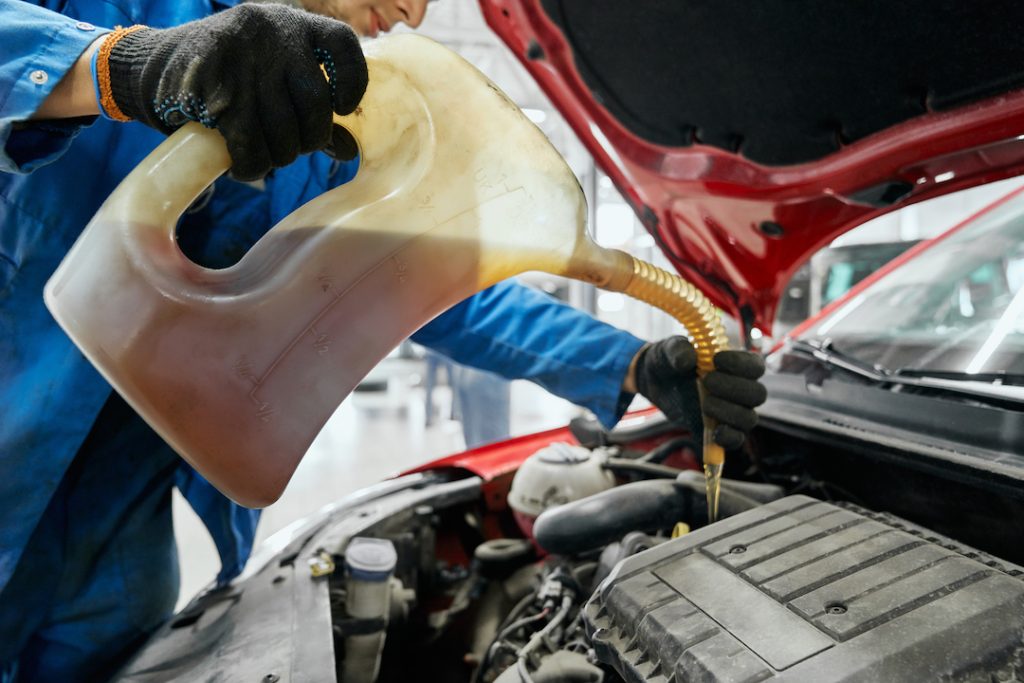Mechanics Auckland – Oil change service
We’ve all heard the advice that we should change our car’s oil regularly. But do we really understand what “regularly” means? What happens if we don’t change the oil? Are regular oil changes still required on new cars?
Let’s take a look and help you understand the many benefits that an oil change can have on your vehicle’s performance.
What’s the difference between an oil check and an oil change?
The first thing to note is the difference between checking your oil and changing your oil.
An oil check
An oil check involves checking the level of oil and the condition or cleanliness of the oil. You can do this yourself, ideally once a month. Some newer cars have electronic oil monitors that will let you know when an oil top-up or oil change is needed. If you have a vehicle that has a dipstick, you can manually inspect your vehicle’s oil level and condition.
The dipstick will have levels marked, either L and H (low and high), MIN and MAX, or simply an area marked with lines. If the top of the oil streak is between the marks, your car’s oil level is fine. If the oil level is below the low or minimum mark, it’s time to top-up or change your oil. If you find your oil level dropping below the minimum line regularly, you may have an oil leak (check for an oil mark on the pavement where you park it regularly).
Looking at the colour of the oil will help you determine whether the oil needs changing. When you remove the dipstick, drag it along a cloth and look at the colour. It should be brown or black. If it’s a lighter, milky colour, this may indicate that coolant is leaking into the engine. If this is happening, get in touch with us to book a service appointment to check it.
But don’t rely solely on the look of the oil to determine whether it’s time to change your engine oil. Once you replace your oil, it can look black within days. So the appearance of the oil isn’t always a good determinant.
If there are metal particles on the cloth where you wipe or drag the dipstick, this may indicate engine damage. We can have a look at this to determine what is happening with your engine.
An oil change
An oil change is when we drain out the old engine oil and replace it with new oil. It’s essential to replace the old, dirty oil as it can cause damage to your engine and other components over time.
Not all engine oil is the same. There are several types of oil to choose from, depending on how much you drive, what type of vehicle you drive and what kind of driving you do. There is long-life oil available, but it may not be ideal for you based on your driving and type of vehicle. We can review this with you and advise you on the most suitable type of engine oil to buy for your particular needs.
Why do you need to change your car’s oil?
Quite simply, an oil change helps keep the engine clean and help your car perform better. It will be more comfortable to drive, and it will be more fuel-efficient – something we’re always looking for as fuel prices continue to rise.
Changing your oil also makes your car safer to run. Keeping up with regular servicing of your vehicle helps prevent it from breaking down. It also ensures the parts and components of your vehicle that keep you safe – brakes, lights, airbags, suspension system, warning lights, windscreen wipers, mirrors, etc. – are all operating at their best.
An oil change is part of this process of looking after the various components that keep your vehicle safe and efficient.
There are several benefits that come with regular oil changes
- Your car’s engine performance is improved
- Your car becomes more fuel-efficient
- You’ll likely save money on fuel and repairs if you keep your vehicle running optimally
- You help to decrease harmful emissions
- You extend the life of your car
- You could receive a higher sale price if you decide to sell it (especially if you keep records/receipts of your service appointments to show a prospective buyer)
How often should you change your engine oil?
So how often is “regular” when it comes to regular oil changes?
The first thing we suggest is to check your vehicle’s owner manual. It will tell you what the vehicle manufacturer recommends. If you don’t have the manual, you can bring your car to us at Roskill Auto Collison, and we can check it for you.
There are a range of factors that we look at when determining how often you should change your oil:
- your vehicle manufacturer’s recommendations
- the age of your vehicle
- how much you drive
- the type of driving you do
We look at the number of kilometres you drive, not the length of time between service appointments. This type of service depends on how much engine use there is, which is impacted by how much you drive and how hard your engine works.
For older vehicles, we usually recommend changing your oil every 5,000 kms. For newer models, that can be pushed out to around 8,000-10,000 kms.
Many newer vehicles have built-in oil life monitoring systems that determine when you need an oil change. An advanced system can analyse operating conditions and usage to alert you on the instrument panel when an oil change is needed. Your mechanic will re-set the monitoring system after an oil change; but remember to re-set it yourself if you change your oil yourself.
If you are a very low-mileage driver or have a vehicle driven less than 5,000 kms per year, we still recommend having an engine oil change every 12 months as routine maintenance. This will help maintain the performance and value of your vehicle.
If you can’t remember the last time you had your oil changed or suspect your car is due for a service, get in touch with us. Routine oil changes and service appointments will help you save money over time as you keep your vehicle in its optimal running condition and prevent more costly or dangerous problems with your car and its many components.
Contact us online or call us on 09 242 1870 to book in for an oil check or oil change.

